Laura ThomasBBC World Service

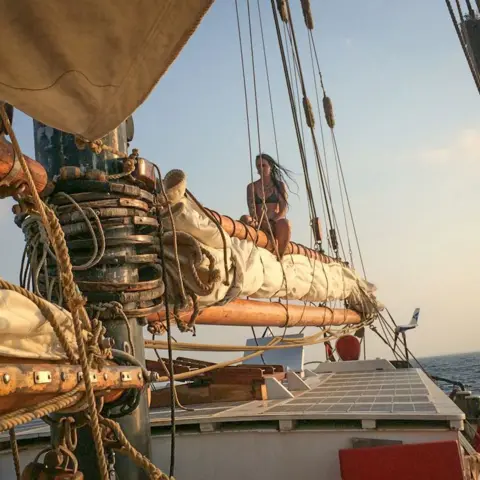 Matthias Berg/Klima Segler
Matthias Berg/Klima Segler
What would you do if you were stuck on a ship, far from loved ones, and you had no idea how - or when - you'd get home? A BBC podcast follows the story of how one young woman's life took an unexpectedly wild turn.
It is New Year's Eve 2019 and Giulia Baccosi is at a party with friends when her phone pings.
The 31-year-old has recently accepted a new job in Sicily, but isn't sure she's made the right call.
"My heart was telling me maybe I should reconsider," Giulia says. "I look up at the sky and ask the universe for a sign - to let me know if I am on the right path."
The message that flashes up on Giulia's phone is from a friend. It says a cargo ship carrying rum and olive oil from Europe to Central America is about to set sail - and it needs a cook.
Giulia has previously worked as a ship's cook and decides she'll take this new job rather than the one in Sicily.
"I'll come with you to Mexico," she says on the phone to the ship's owner, "and then I'll leave."
It is anticipated this leg of the voyage will take about three months - after which Giulia plans to return to her life in Italy. But that's not how things work out.

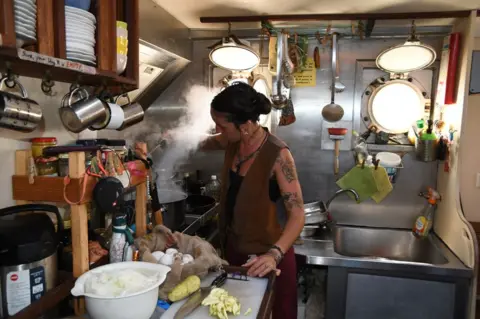 Matthias Berg/Klima Segler
Matthias Berg/Klima Segler
Giulia cooking in the ship's kitchen
In early January, excitement builds aboard the Avontuur - a 100-year-old schooner - as it sets sail from Germany and heads towards the rough waters of the North Sea. Giulia will be cooking three meals a day for the hungry crew and managing supplies.
The first port of call is Santa Cruz de Tenerife and as the Avontuur approaches, the crew can hear the distant drums of the city's enormous carnival. After 36 days at sea, everyone is keen to let their hair down. Once on shore the crew find themselves surrounded by thousands of revellers in dazzling outfits.
"We were just like, 'What to do? Let's join the party!'" Giulia remembers.
The following morning, slightly hungover, a rumour reaches them about some holidaymakers on the island who have fallen ill with a mystery virus and been quarantined in their hotel. But it is soon forgotten as the crew prepare to set sail again.

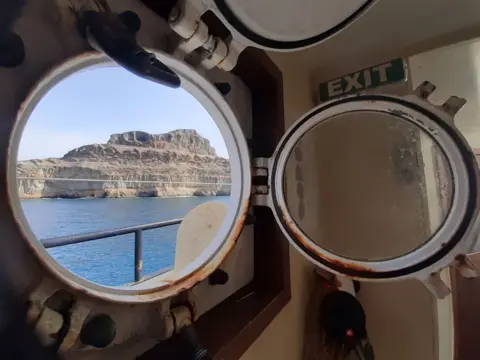 Matthias Berg/Klima Segler
Matthias Berg/Klima Segler
The view through a porthole out to the coast of Puerto Mogan in Gran Canaria
One morning soon after, as Giulia is chopping fruit and stirring porridge, the night watch tells her about an unusual little light that's been spotted on the horizon.
The Avontuur is 45 nautical miles off the coast of Gran Canaria and the light is too far out to be a fishing boat. Suddenly commands are shouted, sails are dropped, and the engine - used only in emergencies - is turned on.
"What is happening?" Giulia says. "Is this really what I think it is?"
As the light comes closer, she sees a small, wooden fishing vessel with five women and 11 men on board, packed so tightly they can barely stand.
"They are waving," Giulia says, "from a distance we can hear them shouting."

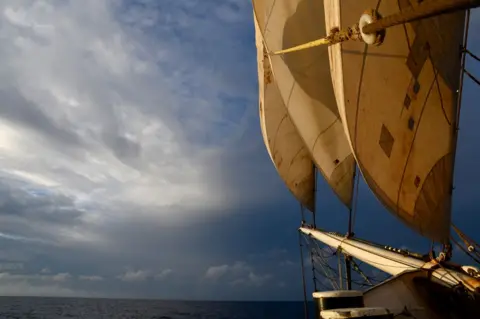 Matthias Berg/Klima Segler
Matthias Berg/Klima Segler
The headsails of the Avontuur filled with wind
As the Avontuur approaches, the people onboard the tiny boat become increasingly distressed.
"They all wanted to be the first one out of that nightmare," Giulia says. "They are the most fragile and vulnerable version of a human being you can be."
The boat's occupants have been drifting at sea for more than 10 days and have run out of water, food, and fuel. The crossing they have tried to make, from West Africa to the Canaries, is one of the most dangerous in the world. Tens of thousands attempt this journey each year, and thousands die.
Brought aboard the Avontuur, the exhausted migrants are fed, watered and given medical attention.
"I remember one of them telling me, 'I didn't know the sea was so big,'" Giuila says.
The Avontuur can't carry an extra 16 passengers, so the coastguard is called.
"There are no heroes... none of us feels like one," Giulia later writes in her diary. "We did what every decent human being should - and would - do in our place."

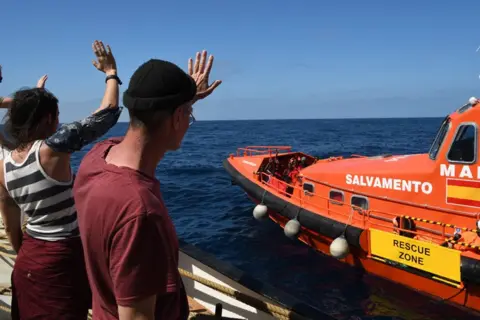 Matthias Berg/Klima Segler
Matthias Berg/Klima Segler
The coastguard collects the migrants rescued by The Avontuur crew
Days later, the Avontuur is back out in the Atlantic, when the crew is asked to gather on deck. The captain reads out an email from the ship's owner.
"The world as you know it no longer exists," the email begins. "Ports are closing, airports are closing, flights are cancelled. Supermarkets, shops, borders - everything has shut."
There is a moment of silence.
"We were all looking at each other a bit astonished, a bit confused," Giulia says. "What is happening to the people we love that are [back] at home?"
The world is beginning to lock down because of Covid - but no one really understands yet exactly what this means.
"I wanted to talk with my boyfriend, I wanted to call my mum, my grandma, my brother," Giulia says. "I was grabbed by the fear that something would happen to them while I was out in the ocean and I can't even speak to them one last time."
The crew's only point of contact with the rest of the world is a single daily satellite email that connects the ship to its headquarters in Germany. Phone signal is still at least six days away.

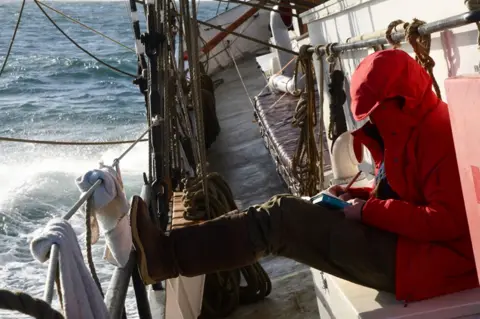 Matthias Berg/Klima Segler
Matthias Berg/Klima Segler
Giulia journaling on deck in high seas
Unsure if they will now be allowed to dock anywhere, the Avontuur sails on towards the Caribbean. As the ship nears Guadeloupe, Giulia sits on deck clutching her phone, waiting for a signal. When the call finally connects she explodes in tears.
"What are you going to do?" Giulia's partner asks.
"I have no idea about anything at all," she replies. "Nobody does."
Normally arrival in a new port means loading and unloading cargo, shore leave, and ordering provisions. For the crew it should be an opportunity to rest, walk on dry land, make phone calls, send messages, and take time for themselves.
"If you have a ship you are sharing with 15 people - you are never more than a few metres away from all the other humans you are living with," Giulia says.
There seems to be little activity at Guadeloupe port, but eventually staff wearing surgical masks approach. They ask the Avontuur to depart Guadeloupe as soon as possible, leaving the ship's crew in disbelief.
Denied shore leave after more than three weeks at sea and still reeling from the news the world is in lockdown, the crew are concerned about what lies ahead. Their next port of call, Honduras, could be as much as a fortnight away.
"Is it really wise to keep going?" Giulia says.
In the weeks that follow, while people on dry land are denied the ability to mix freely, the Avontuur's crew are prevented from stepping ashore at most ports.
It becomes clear any planned arrivals and departures to and from the ship - including Giulia's plan to leave in Mexico - are off the table. It also seems unlikely anyone will be able to set foot on dry land at any port, until the Avontuur is back in Germany.
This means sourcing food becomes increasingly difficult, leaving Giulia worried about how she will continue to feed the 15-strong crew, now confined to a space roughly the size of a basketball court - and among whom tensions are growing.
Giulia's thoughts return repeatedly to her loved ones. She drafts a message, ready to post on Instagram.
"It feels quite surreal to be confined on this floating bubble," she writes. "I hope you are all safe and sound out there."

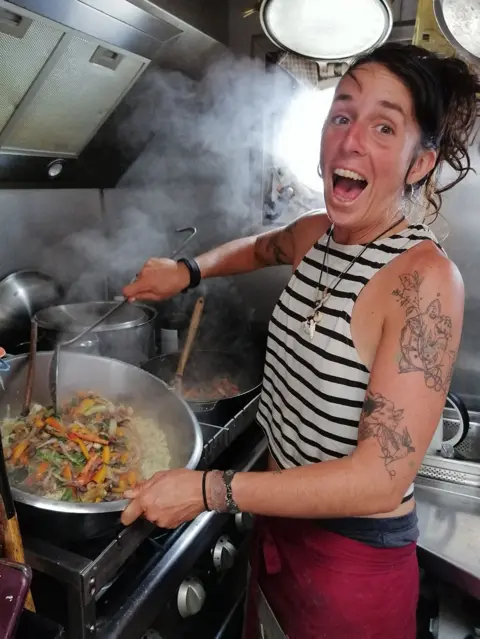 Matthias Berg/Klima Segler
Matthias Berg/Klima Segler
Giulia cooking in the galley on board the Avontuur
To fight boredom and anxiety, the crew embrace crafts, drawing, and playing instruments. They rig a cargo net to swim safely off the stern. Some find a release in romantic relationships.
"There is chemistry, there is attraction," Giulia says. "To look for physical intimacy and physical touch is very human. In those moments you can forget there is something outside that you can't control."
The crew also find comfort in the wonders of the ocean - dolphins and flying fish, and one night an encounter with a pod of friendly minke whales, swimming in bio-luminescent water.
"They are so close we can smell their breath," Giulia says. "The most beautiful moment - which is so magnificent and marvellous and dreamy - and yet, it smells of farts."

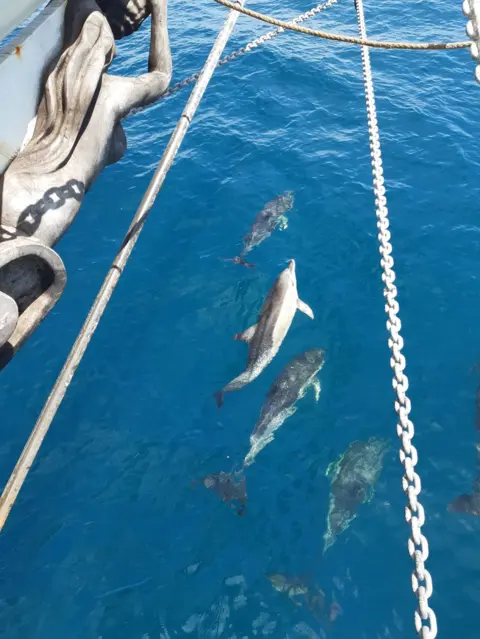 Matthias Berg/Klima Segler
Matthias Berg/Klima Segler
Dolphins at the bow of the Avontuur
At one point the Avontuur has to take evasive action to avoid a hurricane and sails as far north as Newfoundland - off the coast of Canada.
Fresh food is now running out and when Giulia makes an inventory she realises there is not enough dry food to make it back to Germany. Some items, including coffee - "the one thing that propels a sailor" - must be rationed. Then Giulia discovers the gas is also running out.
"It is our main energy to cook," Giulia says, "and we don't have any plan B."
An improvised fireless slow cooker is built from little more than a wooden box, expanding foam, and a yoga mat - and it works.
"Somehow, out of a very serious and worrying situation, we end up enjoying some of the best stew I've ever cooked in my life," she says.
In June 2020 the Avontuur finally makes landfall in Horta, in the Azores - a lush, volcanic archipelago off the west coast of Portugal. The crew, all EU citizens, should be allowed ashore - but first, they must test for Covid.
Days later, the call comes. After four and a half months at sea, they're permitted to land - and Giulia wants to savour every moment.
"I want the flowers, I want the grass, I want the bar, I want the people, I want to go and buy some chocolate," she says, "the possibility to walk and decide if you are going to turn left or right."
Good spirits return among the crew, and they begin to look forward to the final leg of their journey, back towards Europe.
"We know that we are sailing home," Giulia says.

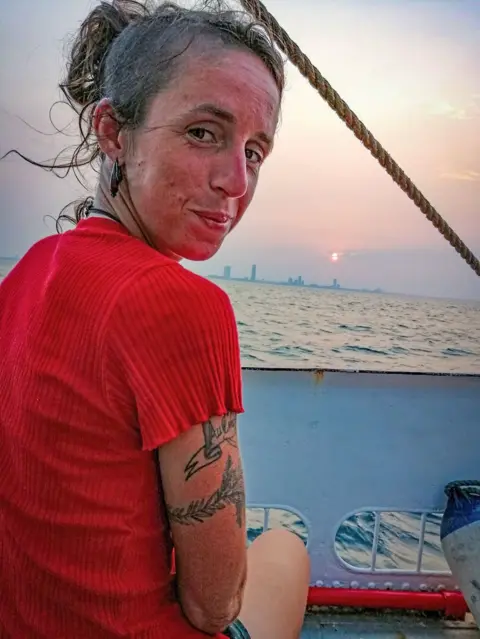 Matthias Berg/Klima Segler
Matthias Berg/Klima Segler
Giulia enjoying the spectacle of sailing past Miami at sunset before a thunderstorm hits
At the end of July, after 188 days at sea, the Avontuur finally approaches the port of Hamburg in Germany. The crew hold hands as the ship docks.
"My eyes filled with tears," Giulia says. "We have been waiting for this for so long - and now it is real."
But there is still work to do. The ship's hold is full of sacks and the 15 sailors must unload the 64 tonnes of olive oil, coffee, cacao, and rum brought from the Caribbean.
"Our duty is done - it is time to celebrate!" Giulia says.
At a homecoming party the crew wear T-shirts printed with the words, "The world as you know it no longer exists" - but Giulia feels changed.
"I am back, but I am not the same as before," she says. "I wonder how I will fit - as a new me - in my old life."

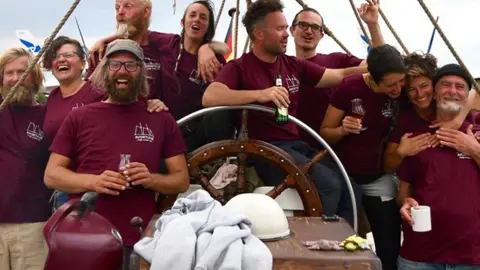 Matthias Berg/Klima Segler
Matthias Berg/Klima Segler
Despite the wild turn Giulia's voyage on the Avontuur took, it didn't put her off a life at sea. She never expected to still be working as a ship's cook, but five years on, she's aboard another boat, somewhere off the coast of Greenland.
And every now and then, just as she did on New Year's Eve five years ago, Giulia looks up at the sky and asks the universe for a sign - to make sure she's on the right path.
.png)




